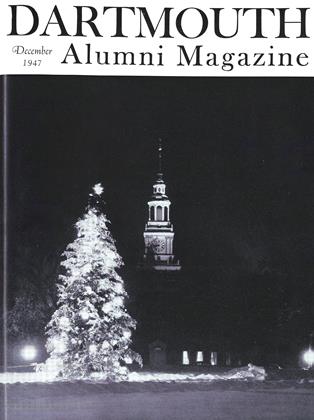In a game that started in a driving rain and ended in a bath of mud, Dartmouth lost to Columbia because they could not hold on to the ball and Columbia could. The Green lost the ball no less than five times on fumbles and once on a pass interception (which could happen in any weather), in addition to having one quick kick blocked. The conditions for accurate ball handling were admittedly atrocious, but it should be noted in this connection that it was raining on Columbia as well as on Dartmouth, that they both used the same ball, and that Columbia made only one fumble—and recovered that. Dartmouth was unquestionably aided in their unfortunate venture by the elements, but the fact remains that they beat themselves by failing to hang on to the ball.
Your correspondent trusts that the readers of this family paper are not passionately interested in the mechanics of the Columbia scoring. Outside of that, however, there is not much to tell, for the offensive efforts of the Green were almost completely nullified by (a) the playing conditions, (b) the Columbia team, and (c) their own inability to grasp the slippery pigskin. During the first half, the uncanny punting of Columbia kept Coach McLaughry's boys backed up against their own goal line almost without respite, with only one tentative Dartmouth excursion in the remote direction of the Columbia end zone. The strong defense of the Green line managed to stave off a hostile score during the first half, but in the second half the Lions came through with two touchdowns and a safety.
The teams were tied with six first downs apiece, with the Indians coming through with a meager total of 57 yards by rushing and 58 by passing. Columbia did not do a great deal better, with 85 and 60 yards, respectively, but they did manage to ensnare the elusive spheroid with enough consistency to do some scoring. Nobody could do very much effective running—or passing—in the gelid slime of Baker Field, although both teams were in there trying. Columbia attempted the daring total of 16 passes, of which 4 were completed and one intercepted by the Green, while the latter ventured some 13 tosses and completed 6 for a better statistical average, but no payoff in the end zone. A quick kick by O'Brien backfired in the third period, when it bounced off the ample chest of a Columbia operative and was gathered in by Dartmouth's Eddie Williams in the end zone for a safety.
The fourth quarter saw the Green piece together several of their sparse offensive activities and penetrate to the Columbia 46 on one occasion and to the 35 on another. Eddie Williams made one of the longest runs of the day for Dartmouth, which turned out to be a matter of 10 yards or so, and Joe Sullivan kept throwing the ball to his operatives on the end of the line with middling success. In terms of making with the ball, which is always sweet music to those who long ago learned to watch the backs go tearing by, there wasn't much to cheer about on this rainy November afternoon.
 View Full Issue
View Full Issue
More From This Issue
-
 Article
ArticleMEN VS. MICROSCOPES
December 1947 By JOHN HURD '21 -
 Article
ArticleHANOVER'S NOTED CLINIC
December 1947 By ALICE POLLARD -
 Class Notes
Class Notes1918
December 1947 By ERNEST H. EARLEY, DONALD L. BARR -
 Class Notes
Class Notes1917
December 1947 By KARL W. KOENIGER, DONALD BROOKS -
 Class Notes
Class Notes1919
December 1947 By J. K. HUNTINGTON, MAX A. NORTON -
 Class Notes
Class Notes1934
December 1947 By FRANKLYN J. JACKSON
Francis E. Merrill '26
-
 Letters to the Editor
Letters to the EditorLetters
April 1941 -
 Article
ArticleBasketball Forecast
January 1950 By Francis E. Merrill '26 -
 Article
ArticleTRACK
July 1950 By Francis E. Merrill '26 -
 Sports
SportsDARTMOUTH 21, HOLY CROSS 21
November 1950 By Francis E. Merrill '26 -
 Sports
SportsBaseball
May 1952 By FRANCIS E. MERRILL '26 -
 Sports
SportsTennis
June 1952 By Francis E. Merrill '26
Sports
-
 Sports
SportsFOOTBALL SUMMARY
January 1921 -
 Sports
SportsGREEN FENCING TEAM WINS FROM PENN 9-5
March, 1923 -
 Sports
SportsWith Big Green Teams
February 1952 -
 Sports
SportsColumbia 25, Dartmouth 19
December 1953 By Cliff Jordan '45 -
 Sports
SportsOther Fall Sports
November 1941 By Frank Hall '41 -
 Sports
SportsHockey
MARCH 1932 By H. H. Hubbard '32

